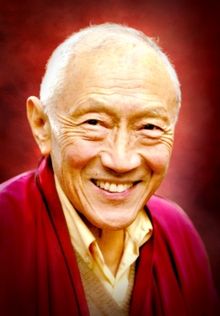- Dagpo Rinpoche
-
Dagpo Rinpoche The Reincarnation of Dagpo Lama Jampel Lhundrup 
Born 1932
Kongpo, Southeastern TibetPart of a series on Tibetan Buddhism
History Timeline · Related-topics Schools Nyingma · Kagyu · Sakya · Gelug · Bön · Jonang Key concepts Three marks of existence · Skandha · Cosmology · Saṃsāra · Rebirth · Bodhisattva · Dharma · Dependent origination · Karma Major figures Gautama Buddha · Padmasambhava · Je Tsongkhapa · Dalai Lama · Panchen Lama · Lama · Karmapa Lama · Rinpoche · Geshe · Terton · Tulku Buddhahood · Avalokiteśvara · Four stages of enlightenment · Tantric yoga · Paramitas · Meditation · Laity Changzhug · Drepung · Dzogchen · Ganden · Jokhang · Kumbum · Labrang · Mindroling · Namgyal · Narthang · Nechung · Pabonka · Palcho · Ralung · Ramoche · Sakya · Sanga · Sera · Shalu · Tashilhunpo · Tsurphu · Yerpa Chotrul Duchen · Dajyur · Losar · Monlam · Sho Dun Texts Kangyur · Tengyur · Tibetan canon · Mahayana sutras · Nyingma Gyubum Sand mandala · Thangka · Ashtamangala · Tree of physiology Outline · Comparative studies · Culture · List of topics · Portal
Dagpo Rinpoche (born 1932[1]), also known as Bamchoe Rinpoche, is a lama in the Tibetan Buddhist tradition.[1]
Contents
Biography
Born in Kongpo, located in southeastern Tibet,[1] Dagpo Rinpoche was recognized by the Thirteenth Dalai Lama as the reincarnation of Dagpo Lama Jampel Lhundrup when he was only two years old.[1] At age six, Rinpoche entered Bamchoe Monastery[2] where he first learned to read, write, and began his studies on Buddhism.[2]
At age thirteen, Dagpo Rinpoche began studying Buddhist philosophy at Dagpo Shedrup Ling.[2] When he was twenty four, he continued his studies at Drepung Monastery.[2]
Throughout his studies, Dagpo Rinpoche had the opportunity to study under many great Buddhist masters such as His Holiness the Dalai Lama,[2] Kyabje Ling Rinpoche[2] and Kyabje Trijang Rinpoche,[2] and His Holiness himself.[2]
In 1959, as the Chinese invaded Tibet, he followed His Holiness the Dalai Lama into exile in India.[1]
Quotes
"In today's modern society there are huge problems. Everyone wants happiness and to avoid suffering but we do not know how to achieve it. Sometimes we try to do it by accumulating wealth or by harming and dominating others."There are those who think they can be happy by taking control over others and misleading them. They commit dishonest deeds. As a result they create problems for themselves. Buddhism can help pinpoint the source of our unhappiness."People have to learn to lead an ethical and principled life.You must respect others as well as yourself. You must respect not only human life but also that of other beings. Ideally we should refrain from killing any form of life. Conflicts can be avoided through mutual respect and discussions.References
External links
- Tibetan spiritual master releases new book, The Star Newspaper, March 12, 2007
- Institute Ganden Ling
- Guru's Feet
- Lho Gyu Shertchine Ling
- Dagpo Rinpoche's Pathway to Happiness
- “Is Buddhism Still Relevant in the 21st Century?”
- Canada Tibet Committee
Categories:- 1932 births
- Living people
- Lamas from Tibet
- Buddhist monks from Tibet
- French people of Tibetan descent
- Rinpoches
- Buddhist biography stubs
- Tibet stubs
Wikimedia Foundation. 2010.

